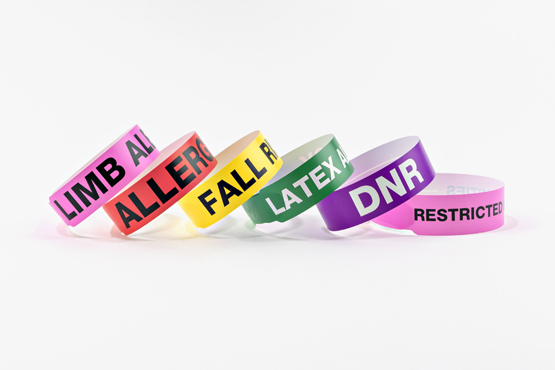Patient Identification Band: Enhancing Precision and Effectiveness in Hospitals
Patient Identification Band: Enhancing Precision and Effectiveness in Hospitals
Blog Article
Exactly How Patient Identification Band Plays a Vital Duty in Patient Management and Treatment
Patient Identification bands work as a crucial cog in the detailed equipment of medical care systems, working as a safeguard versus clinical errors. As the frontline tool for verifying Patient identity, these bands underpin vital processes from administering the correct medication to making sure the appropriate individual undergoes the designated procedure. The profound effect of such an ostensibly simple device on Patient safety, experience and outcomes could shock lots of, leaving one to contemplate the potential innovations and innovations that might further improve their performance.

Recognizing the Basics of Patient Identification Bands
Despite the simplicity of their appearance, Patient Identification bands offer a critical role in medical care settings. They typically display the Patient's complete name, date of birth, and a distinct Identification number, serving as the primary source of Patient Identification - patient identification band. The usage of these Identification bands is thought about an universal method in health care, intended at making sure Patient safety and accuracy of care shipment.
The Duty of Patient Identification Bands in Reducing Clinical Mistakes
A shocking number of medical errors happen due to Patient misidentification, highlighting the important role of Patient Identification bands. These bands, often outfitted with barcodes or QR codes, consist of vital Patient information such as name, age, and medical background. In high-stress settings where medical personnel juggle numerous obligations, Patient Identification bands offer as a trusted and fast recommendation.
Enhancing Patient Security With Identification Bands

The Effect of Patient Identification Bands on Patient Experience
Nearly all patients in medical care setups experience the usage of Identification bands during their treatment trip. These bands, typically used around the wrist, have a profound impact on the Patient experience. They offer as a continuous, visible pointer of the Patient's identification and clinical problems, assuring individuals that they are identified and cared for.
Future Growths and Technologies in Patient Identification Bands Innovation
While current Patient Identification bands have actually proven efficient in enhancing care, the perspective of technical advancements assures also greater improvements. RFID tags can give real-time Patient area tracking, while QR codes can save extensive Patient information obtainable through smart device scanning. Hence, future technologies in Patient Identification bands hold significant potential in reinventing Patient care.
Final thought
Patient Identification bands are an important possession in medical care, making certain accurate Patient Identification and reducing clinical errors. These devices enhance Patient safety, increase why not try here confidence in health care systems, and improve Patient experiences and read the full info here end results. With the capacity for future improvements in Identification band modern technology, their function in Patient monitoring and care is set to come to be even a lot more essential, enhancing their relevance in the distribution of reliable and secure health care.
Exactly How Patient Identification Band Plays a Crucial Duty in Patient Monitoring and Care
An astonishing number of medical errors happen due to Patient misidentification, underscoring the important function of Patient Identification bands. patient identification band.Undoubtedly, the use of Patient Identification bands significantly enhances Patient security in health care setups. Therefore, future innovations in Patient Identification bands hold considerable capacity in changing Patient treatment
Patient Identification bands are an indispensable asset in health care, making certain exact Patient Identification and minimizing clinical errors.
Report this page